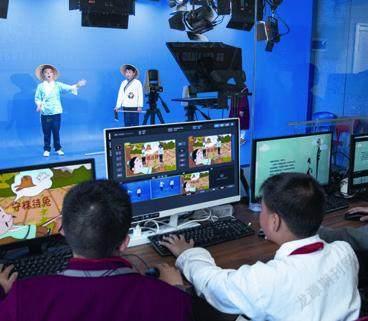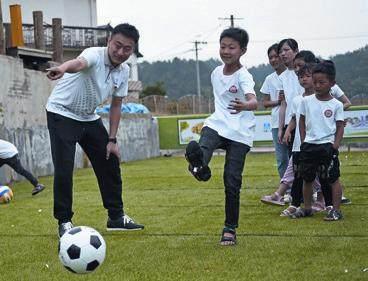SCORING POINTS
By Lu Yan
Xu Ruobing, a first-grader at a middle school in Beijing, has seen a significant change in her schoolwork. This change came after the country adopted a series of policies to reduce the excessive burden on students, such as the guideline issued by the central authorities in late July 2021 to further reduce the burden from excessive homework and after-school tutoring for primary and middle school students, also known as the “double reduction” policy.
“See, my English workbook, for example, is much thinner than last semester’s,” Xu told Beijing Review, adding she’s happy now that she has much more free time after school than before and can indulge in her interests, like drawing—which her mother approves of.
“With the new government policies starting to show results, we need to push forward reform so that academic scores are no longer the only focus of schools, parents and students; and children can tap into their full potential and live a colorful life,” Xiong Bingqi, educationalist and head of Beijing-based 21st Century Education Research Institute, told Beijing Review.
Before the “double reduction” policy was announced in 2021, Xu believed she was busier after school than on campus. On weekends, she had to take about five extracurricular training classes, each about two hours long. Their subject matter ranged from math and English, which she struggled with, to public speaking and drawing. The latter two are not prominently featured in the school curriculum, but Xu showed great interest.
On weekdays, Xu would usually finish her homework at around 10 p.m.; on weekends, she was busy shuttling between tutoring classes.
“I knew sometimes she was too busy to enjoy her childhood, but I think this was still a much better option than failing in school and thus not getting into university. She, and I, had to hang in there—for the sake of her future,”Zhang Hua, Xu’s mother, said, adding she had no choice but to follow suit because other students were living a similar schedule. “If I didn’t do the same and just let my child live a carefree life, we’d fall behind.”
“Students were under great pressure from the neijuan mentality,” said Wang Bin, council member of China Nature Education Network, a social organization concentrating on the promotion of nature education, a subfield of environmental education.
Neijuan or involution was originally used by anthropologists to describe the self-perpetuating process that keeps agrarian societies from progressing. It has now become a shorthand used by Chinese urbanites to describe the ills of their modern lives: Parents feel intensely pressurized to provide their children with the very best, and children must stay in the educational rat race.
In the past, curriculum-based tutoring institutions offered academic course training, some with subjects or content well ahead of the official school curriculum. Moreover, they offered further training on weekends, as well as during national holidays and school vacations, which left students with very little time to do their own thing and even widened the academic gap. Some students, after getting extra training, would stand out“too much” or do “too well” in school, triggering anxiety in fellow students and their parents, thus worsening the neijuan effect.
Following the implementation of the “double reduction” policy, according to statistics from the Ministry of Education (MOE), the number of afterschool training institutions offering academic training to primary, middle and high school students in China dropped from 124,000 in mid-2021 to 9,728 in late February this year.
“While China’s traditional education model has constantly been reformed, it remains exam-oriented as some consider this to be the most equal way to evaluate students,” Wang said.
In the very recent past, basic education still saw primary and secondary school students with their noses buried in books. This system overlooked the cultivation of students’ interests in extracurricular activities, Xu Weilin, an academician with the Chinese Academy of Engineering, wrote in an article published on China Science Daily in May.
Xiong believes the key to stopping schools, parents and students from merely chasing high scores and becoming slaves to books lies with the government. “The authorities must invest more in the overhaul of the educational evaluation system so that a student’s performance is judged on multiple levels, including test scores, creativity, physical agility, and so on,”he said.
To shake up the status quo, the government has been adopting measures to ensure the well-rounded development of all children and embrace more diversity in school courses and options. For example, most recently, social media posts about a cooking course for school kids, as part of a revamped life skill program to be delivered nationwide in September, went viral. The MOE rolled out a new national curriculum standard for compulsory education in May, which outlines different cooking and nutrition courses for students in different grades.
Apart from teaching essential life skills like cooking and housekeeping, the program is designed to enrich their knowledge and skillset in production work as well as services, such as growing plants, raising small animals and maintaining housewares and appliances.
“Through their learnings and experiences, students will develop a respect for labor, gain the ability to produce innovations and apply their knowledge and skills in real life, further adding a sense of social responsibility,” the MOE said.
“Schools should take the lead in teaching life skills, and families should play a supporting role. Schools, families and society should all work together to promote education,” said Gu Jianjun, an MOE official in charge of the program.
In response to the policy, many schools have taken action. Xinghu School in Liangjiang New District in Chongqing has turned the rooftop of its 6,000-square-meter teaching building into a garden, planting over 10,000 sunflowers. The students can weed, water and harvest the plants with their own hands.
Rural primary and secondary schools in Guigang, Guangxi Zhuang Autonomous Region, have invited agricultural technicians, as well as planting and breeding experts, to tutor students. And their teachings prove very popular with students.
Xiong suggested that localities should warrant investment in school labor education and hire qualified teachers to manage such courses; vocational schools and social institutions should also offer educational resources. Furthermore, outstanding craftsmen from different industries, inheritors of intangible cultural heritage and experienced farmers and skilled workers, too, can serve as instructors.
He also suggested vocational education should receive further development so that students who are not very interested in academic achievements can explore other options, receive professional training, and forge their own career paths. “However, most parents still prefer university to vocational institutions. The stereotype of the latter being inferior needs to change,” Xiong added.

The newly revised Vocational Education Law that went into effect on May 1 is expected to improve the quality and status of vocational education.
With the decline of after-school academic tutoring, many parents started looking into more “educational” hobbies for their children. “Otherwise, my daughter’s eyes would be glued to her smartphone when she was not doing her homework. This worries me,”Sun Pingping, the mother of a middle school student in Dalian, Liaoning Province, said, adding that her daughter has since taken up singing, badminton and taekwondo.
“It’s okay for me if she’s not top of her class. But I do hope she can live a happy life and pursue a career that she likes or can be good at,” Sun said, expecting that a hobby not only can inspire deeper interest, but can also help with both the physical and psychological development of her child, and provide her with more alternatives for the future.
Interest is indeed the best teacher, and nature is a source of interest, Wang said. As an emerging after-school learning activity, nature education is now capturing the attention of parents and children alike. Taking children into the great outdoors and letting them feel the beauty of nature can spark their interest in science, geography and related topics.
With Omicron variant resurgences across several Chinese regions, museums, such as the Museum of Biology under Peking University, the Shanghai Natural History Museum and some other natural science museums, have launched online digital exhibitions.
Similarly, renowned film director and national legislator Jia Zhangke suggested before this year’s annual session of the National People’s Congress in early March that museum trips should be included in the national compulsory education system. Specifically, he hoped the education department will formulate a list of historical and cultural heritage and museums suitable for primary and secondary school students, and develop corresponding teaching materials and courses so that students can more systematically and comprehensively grasp Chinese culture and history.
Maintaining good health is another priority in children’s development. Malnutrition, obesity, myopia, and dental cavities are some of the problems still facing young people, according to a report on Chinese children’s development released by the China National Children’s Center and Social Sciences Academic Press (China) in late 2021.
There’s also a gap between children growing up in rural and urban areas. In general, the anemia rate among rural children exceeds that among their urban peers. In terms of obesity, it’s the other way around.
The results of the National Student Physique and Health Survey show that from 2010 to 2019, the number of primary and secondary school students undertaking physical exercise for at least one hour per day continued to increase; this upward trend can also be seen in measures of their health. However, in 2019, the number of these active pupils still accounted for less than 50 percent of the nation’s overall student body, indicating that there is much room for improvement.
Moreover, mental health, too, should not be ignored. A report on national mental health development published by the Institute of Psychology under the Chinese Academy of Sciences in March 2021 showed that the rate of depression among adolescents surveyed stood at 24.6 percent.

Wu Yihuan, a member of the National Committee of the Chinese People’s Political Consultative Conference, said that parents are not well educated on the topic of children’s mental health, and some underestimate the issue. The lack of counselors and relevant services at schools, communities and hospitals also doesn’t help matters.
“Multiple parties should join hands in this endeavor,” Wu told People.cn. For instance, media and government should upgrade their promotion of the importance of children’s mental health; schools can host seminars, discussions and training sessions for parents, Wu added.
In September last year, the Outline on the Development of Chinese Children (2021-30) specified 70 major objectives and 89 measures, focusing on children’s health, safety, education as well as four other aspects.
By 2030, the system of laws, regulations and policies protecting children’s rights will have been greatly enhanced, with the current rural-urban gap in children’s development significantly narrowed, according to the outline for children’s development.
Children will enjoy more equal and accessible basic public services and more inclusive welfare by 2030, the document read. BR

